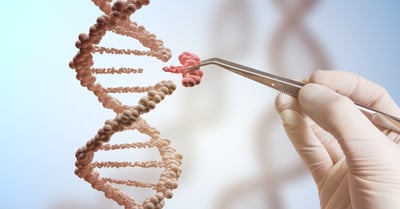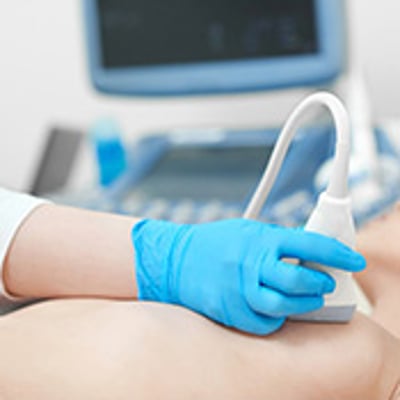FORCE's eXamining the Relevance of Articles for You (XRAY) program looks behind the headlines of cancer news to help you understand what the research means for you.
XRAY is a reliable source of hereditary cancer research-related news and information.
Learn more about the XRAY program
Categories Cancer Risk
Relevance: Medium-Low


Strength of Science: Medium-Low


Research Timeline: Human Research


Study : No new high-risk breast cancer genes here
Relevance: Medium-Low


Strength of Science: Medium-Low


Research Timeline: Human Research


Most relevant for: People with a family history of breast cancer but no known inherited mutation
While some of the genes that cause hereditary breast cancer are known (for example, inherited mutations in genes like BRCA, ATM and PALB2), others remain unidentified. Two studies found 72 DNA changes (also known as “variants” or “SNPs”) that affect breast cancer risk. These variants are different from mutations in genes that dramatically increase cancer risk. Most of these new variants are located outside of the portion of DNA that is used to make proteins. Further research is needed on these new variants before they can be used by doctors to help people understand and manage their risk for cancer. (1/12/18)
Read More
Relevance: High


Strength of Science: Medium-High


Study : Birth control and breast cancer risk among younger women
Relevance: High


Strength of Science: Medium-High


Most relevant for: Young women on, or considering taking hormonal birth control
On December 7, 2017 the New England Journal of Medicine published results from a study by Lina Mørrch of the University of Copenhagen and colleagues showing that hormonal contraceptives (birth control) increase the risk of breast cancer. The study is unique because it is one of the first to specifically assess the breast cancer risk associated with newer, low-dosage methods of contraception. The large and significant effort analyzed medical data of nearly 1.8 million young women in Denmark on average for over 10.9 years. Results were covered widely in the U.S. by many major media outlets, including the New York Times, USA Today, Forbes and Time. (12/14/17)
Read More
Relevance: Medium-High


Quality of Writing: High


Article : Dense breasts and mammograms: Jill Goodacre’s story
Relevance: Medium-High


Quality of Writing: High


Most relevant for: Women with dense breast tissue on mammograms
Korin Miller’s piece for SELF magazine focuses on why women with dense breasts may need more than a screening mammogram. Miller highlights the recent story in People magazine of Jill Goodacre, a former Victoria’s Secret model and the wife of recording artist and talk show host Harry Connick Jr. Goodacre told of her breast cancer diagnosis 5 years ago after having additional screening of her dense breast tissue following a normal mammogram. (12/8/17)
Read More
Study : Alcohol and breast cancer risk in African American women
Most relevant for: African American women who would like to lower their breast cancer risk
The link between alcohol intake and breast cancer is well known, but most studies have involved only White women. Recently, a large study of more than 22,000 African American (AA) women found that similar to White women, increased alcohol consumption is associated with a greater risk of breast cancer. (10/27/17)
Read More
Article : Mixed reviews of at-home genetic testing
Most relevant for: People who are considering or have had direct-to-consumer testing
National guidelines recommend that patients meet with a genetics expert before undergoing genetic testing for cancer risk. Genetic counseling can help patients decide whether genetic testing is right for them and order the most appropriate test. Once test results are available, genetics experts also help patients understand their results. Over the last decade, the popularity of direct-to-consumer (DTC) genetic testing, such as 23andMe has grown. Some genetic tests are marketed to consumers on television, in print advertisements, and on the Internet. These “at-home” genetic tests give people direct access to their genetic information without first involving a healthcare provider in the process. A recent report outlines the benefits and limitations of DTC genetic testing. (10/20/17)
Read More
Relevance: Medium-High


Strength of Science: Medium


Study : Beauty and the breast: hair product use and breast cancer risk
Relevance: Medium-High


Strength of Science: Medium


Most relevant for: Women who use hair products who are concerned about their risk for breast cancer
Past studies using mostly animal models showed a link between use of hair products (dyes, straighteners and relaxers) and increased risk of certain cancers. In this study, researchers looked at data on hair product use among African-American (AA) and White women to see if certain types of hair products increased breast cancer risk, and how that risk might differ between race and breast cancer hormone status. (9/27/2017)
Read More
Article : Can lifestyle changes impact breast cancer risk?
Most relevant for: Any woman concerned about her risk for breast cancer
A recent New York Times article shared how “adopting protective living habits” could help keep breast cancer “at bay”. While many of these lifestyle changes and strategies like not smoking, avoiding weight gain, reducing alcohol consumption, eating a heart-healthy diet, and increasing physical activity have been shown to reduce breast cancer risk, there are other risk factors that one cannot control such as having a BRCA or other mutation that significantly increases breast cancer risk. Importantly, no one strategy has been proven to totally eliminate breast cancer risk. However many of these approaches have overall health benefits. (9/21/2017)
Read More
Relevance: Medium-High


Strength of Science: Medium-High


Research Timeline: Post Approval


Study : Does expanded genetic testing benefit Jewish women diagnosed with breast cancer?
Relevance: Medium-High


Strength of Science: Medium-High


Research Timeline: Post Approval


Most relevant for: Jewish women with breast cancer who previously tested negative for the three most common BRCA mutations
BRCA1 and BRCA2 mutations are common in people of Eastern European (Ashkenazi) Jewish descent. About 2% of all Ashkenazi Jewish people will test positive for one of three common mutations in these genes. Genetic testing for Jewish people sometimes focuses on only the three most common mutations. For Jewish women with breast cancer, little is known about their chance of carrying a different hereditary mutation that may increase risk. This study looked at expanded genetic testing in Jewish women diagnosed with breast cancer to learn how often they carried mutations other than the three most common BRCA gene mutations found in Ashkenazi Jewish people. (09/13/17)
Read More
Relevance: Medium-High


Strength of Science: Medium


Research Timeline: Post Approval


Study : Does aspirin lower a woman’s breast cancer risk?
Relevance: Medium-High


Strength of Science: Medium


Research Timeline: Post Approval


Most relevant for: Women at average risk for breast cancer
Women who take aspirin regularly may have a reduced risk of breast cancer. However, previous studies have reported mixed results. Few of these studies have looked at whether this potential benefit of aspirin is linked to specific types of breast cancer. This study found a small reduction in breast cancer risk for women who took a low-dose aspirin at least three times per week, but only for one subtype of breast cancer. Women who took aspirin were less likely to develop ER/PR-positive, Her2- negative breast cancer, the most common type of breast cancer. This study found no breast cancer risk reduction for women who used regular-dose aspirin or other nonsteroidal anti-inflammatory drugs (NSAIDS). (8/29/17)
Read More
Relevance: Medium-High


Quality of Writing: High


Article : Parents face challenges when deciding the best time to tell children that they may be at high risk for cancer
Relevance: Medium-High


Quality of Writing: High


Most relevant for: Parents who have an inherited gene mutation
When certain types of cancers run in families, genetic testing can determine whether the cause is hereditary. Genetic testing can help family members understand their cancer risk and make medical decisions to stay healthy. A test result can provide significant insight, but it also creates challenges for parents, because gene mutations that cause hereditary cancers can be passed from mothers and fathers to sons and daughters. People with these mutations must make difficult decisions about when to tell their children that they too may have inherited the mutation. (8/22/2017)
Read More